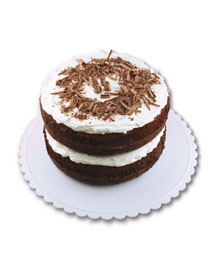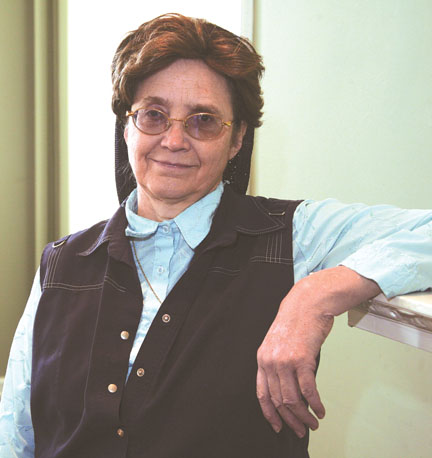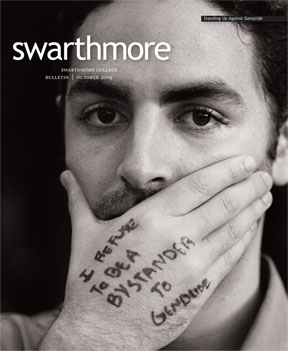My Layer-Cake Life
What has been pushing my professional life can be summed up in a single sentence: My father was a university professor who did not get tenure and a writer who never published a book. I didn’t quite grasp the significance of all this until I was a 16-year-old honors student about to finish high school and he told me, “Well, of course you will get your Ph.D.”
Although that key sentence may describe what I did, I never thought of it as defining my aspirations, which I summed up on request as a 15-year-old: I want to be the sort of person people are happy to have known, and I want to raise my children well. That slant, I am sure, came from my mother. To this day, when my daughters-in-law speak to my mother on the phone, they hang up with the feeling that they have just been talking to me.
There is, however, a cream filling between the career layer and the family layer of my cake, which comes from somewhere deep inside. One winter day during my senior year at Swarthmore, I walked into one of the rooms in Bond, wearing a turquoise dress, with my auburn hair down to my waist. The three Swarthmore professors in formal attire, who were interviewing me for a Danforth Fellowship, asked various questions about my hopes of joining my husband David ’67, in graduate school at Harvard, and continuing into university teaching. Then the chair of the committee cleared his throat uncomfortably and the other two fidgeted in their chairs. He leaned forward and asked, “Now, Mary, for the Danforth, we have to ask. Do you have any spiritual leanings or perhaps a commitment to social action?” Everyone hung on my answer.
“Oh, yes,” I said brightly. “I recently converted to Orthodox Judaism.”
All three members of the committee sank back into their chairs with relief. It shows how things have changed that, for a fellowship originally set up for Episcopalian boys, this was a more than satisfactory answer.
This “cream filling” may seem like the most un-Swarthmore-like thing I did at the College, but it actually started in a very Swarthmore-like way—with a search for intellectual honesty. I was raised with a commitment to honesty in all its senses—telling the truth, not stealing or cheating—but as I worked my way through a self-imposed program of reading one book by each of the great philosophers, I was hard put to find a solid reason for being “good” in modern secular philosophy.
I had a lot of Jewish friends, and their religion—even for the most assimilated among them—seemed to have a staying power to which the rather liberal Protestant denomination in which I had been raised did not even aspire. One of them—a fellow female counselor for the girls in a math summer camp—even taught me how to sound out Hebrew and passed on some of the fundamentals of keeping kosher and observing the Sabbath.
In my junior year, I asked to speak at College Sunday—the first Sunday of winter break—where college students active in our church’s youth group were invited to address the congregation about their college experiences. This was an unusual request, because most upperclassmen have forgotten their way to the church.
After two freshmen had, indeed, explained that religion played no role at all in their college lives, I stood up with my “J’accuse.” We had theoretically been taught about all the major religions. We had visited a Catholic church, a synagogue, and a mosque. However, the subliminal message had been that religion is a crutch, inappropriate for intellectuals. “You have made it impossible,” I claimed, “for us to believe in G-d.”
My manifesto had three immediate consequences. The director of religious education resigned, saying that I was absolutely right. The minister resigned, having decided that he would rather be a social worker. And I asked myself, “Who are these people to decide what I can or cannot believe?”
My actual decision to convert to Judaism was made during the following spring, which I spent as a foreign student in Germany, in the shadow of the Holocaust.
 A fancy cake like that, with two layers and a cream filling, ought to have chocolate frosting, right? Here it comes. I had to race through Harvard because my husband had started two years before me, and we wanted to get our Ph.D.’s together, in order to have a better chance of solving the “two-body problem” of getting academic jobs in the same city. We both got jobs in Israel, as we wanted, but, like my father, neither of us got tenure at our first jobs, for reasons which looked to us at the time like prejudice.
A fancy cake like that, with two layers and a cream filling, ought to have chocolate frosting, right? Here it comes. I had to race through Harvard because my husband had started two years before me, and we wanted to get our Ph.D.’s together, in order to have a better chance of solving the “two-body problem” of getting academic jobs in the same city. We both got jobs in Israel, as we wanted, but, like my father, neither of us got tenure at our first jobs, for reasons which looked to us at the time like prejudice.
When I finally did get tenure at my second job, I spent the summer writing a novel about prejudice. Over the following decades, I wrote other novels about the kidnapping of our foster baby, about conversion, about a court case to protect a different set of foster children, about arranged marriages, about cultural divides. Most of them, in essence, are about prejudices of various kinds and their effects on people.
I publish in a “niche”—the thriving haredi (ultra-Orthodox) publishing industry—and write for no more than one hour in the evening, to protect my mathematical research time.
How do I manage my striated life? Mostly by keeping the layers separated in time and space. We live in Bnei Brak, a very religious community across the highway from our university. About 40 women get up at five in the morning to pray in the synagogue down the street (along with 200 men), and sometimes I join them. Many of the ladies don’t know my name, but those who do surely think of me as Rabbanit Schaps rather than Professor Schaps. (A “rabbanit” is a rabbi’s wife. It is an honorific: Raising a Jewish family on high scholarly standards is a project for both husband and wife.) Those who know that I work at the university can’t figure out what I am doing there eight hours a day, five days a week when I actually teach only six hours a week, six months a year. I am also “Rabbanit” to the men in the daily Talmud class that David teaches.
Once I cross the highway on the pedestrian bridge, I land among a population equally clueless about my private life. In Israel, you cannot get dressed in the morning without making a political statement, so everyone I meet knows from my long sleeves and the beret I wear over my wig that I am religious. It is, in fact, a religious university, so this is not even scandalous. I teach my classes, give talks in seminars, serve on committees, all without any reference being made to my religiosity. Once someone did ask my husband, “How can you walk into an international conference wearing a black hat and sidelocks?”
“Well,” David answered, “first I move my right foot forward, and then my left. Before you know it, I am through the door.”
My father passed away more than 30 years ago. Every year, on the anniversary of his death, I light a 24-hour candle and take out one of the files of his old letters or amusing articles, like the one titled “Why I Won’t Send my Daughter to College.”
When I stand on a podium at Hebrew University, introducing former Secretary of the Treasury Lawrence Summers to members of the Harvard Club of Israel, does my father know about it? When, as chair of the Mathematics Department, I opened a new program in financial mathematics, was he somehow aware? Has he “seen” the covers of my novels? I don’t know; but if he does, I’m sure he is pleased, just as he was always pleased when I baked a layer cake for Sunday afternoon tea.
Malka Kramer Schaps ’69 earned a Ph.D. in mathematics from Harvard in 1972, after which she and her husband David ’67 took university jobs in Israel. They have four children, two of them foster children who remained with their family, and, currently, 12 grandchildren. David was a rabbi in the army reserves and ended his 30 years of service with the rank of captain. In addition to her professional publications, Schaps has published five novels and two nonfiction works on the Holocaust. She is currently a professor and director of the Financial Mathematics Program at Bar-Ilan University, where David is associate professor and chair of the Department of Classical Studies.
 Email This Page
Email This Page
